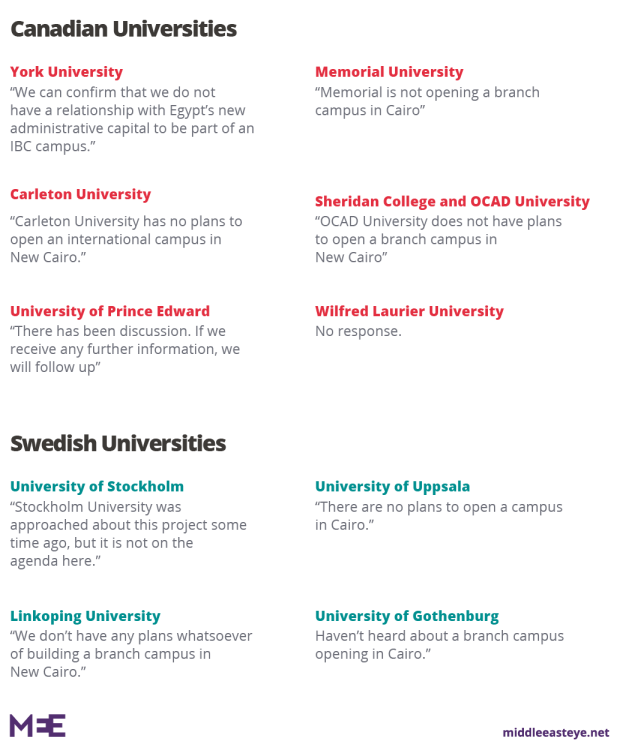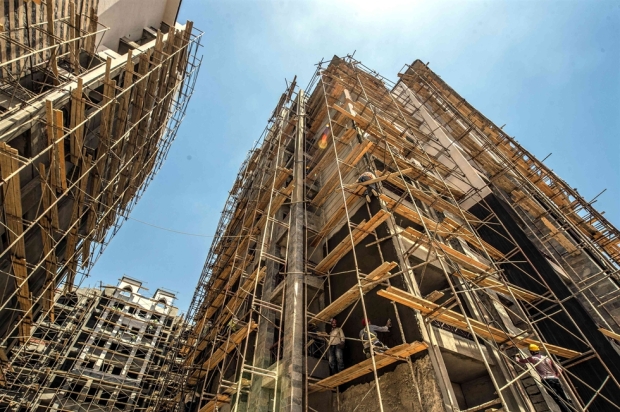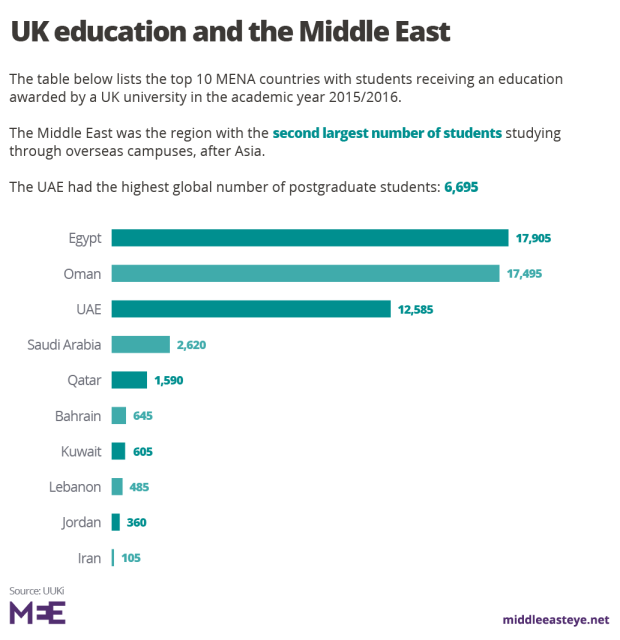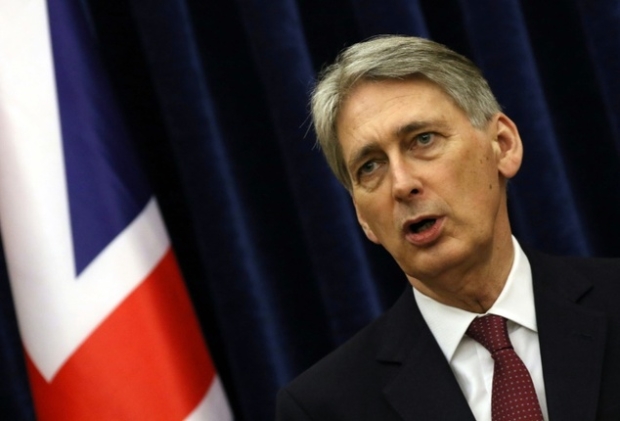Egypt makes bogus claims to lure UK universities to new multi-billion city
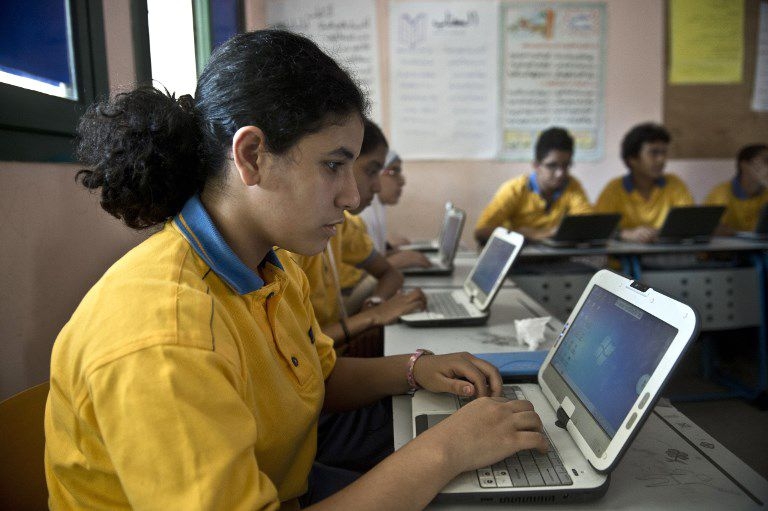
Egypt claimed to have secured non-existent partnerships with 10 international universities to encourage British institutions into setting up similar ventures, Middle East Eye can reveal.
Using documents leaked to MEE, Khaled Abdel-Gaffar, the Egyptian minister for higher education, told representatives of a group of British universities at a London conference in November that six Canadian and four Swedish universities had signed on for future partnerships to be based in New Cairo.
The multi-billion-dollar administrative capital, announced in March 2015, is located 45km east of present-day Cairo and forms the backbone of President Abdel Fattah al-Sisi's ambitious Vision 2030 economic plan.
But the Canadian and Swedish universities approached by MEE said that they had been approached by Egypt but not agreed to any deal; or else had never even heard about the proposal.
The 1 November meeting was coordinated by the British Council, which represents cultural and educational opportunities overseas, and UUKi, the international arm of Universities UK, which represents British universities.
After the meeting, at UUKi HQ at Woburn House in London, Abdel-Ghaffar and his delegation met representatives of King’s College London and the University of Glasgow among others.
Using the presentation leaked to MEE, the Egyptian delegation told the meeting that it had established partnership agreements with 10 international branch campuses (IBCs), a source present told MEE on condition of anonymity for fear of losing their job.
Abdel-Ghaffar also announced during the International Education Conference in London on 2 November that New Cairo will host six international universities from the US, UK, Hungary, Canada, Sweden and France.
Egypt wants to diversify its economy and attract foreign investment as part of its Vision 2030 economic plan, for which it needs an educated workforce.
The UK education sector, meanwhile, is looking for worldwide markets into which to expand, more so after the 2016 Brexit vote.
There was a 35 percent increase in the number of students studying for UK university programmes within Egypt from 2013/14 to 2015/16, according to the UUKi. Figures from 2015-16 indicate that nearly 20,000 students in Egypt were studying for UK degrees, mainly through joint programmes.
It makes Egypt the fifth-largest host country for UK transnational education, accounting for just over five percent of the British worldwide total and making it the top market in the MENA region.
Universities: No plans for Egypt
But Abdel-Gaffar’s presentation was contradicted by several of the universities mentioned.
When contacted by MEE, all four Swedish universities - University of Gothenburg, University of Stockholm, University of Uppsala and Linkoping University - denied that any agreement existed.
Lennart Falklof, head of communications at Linkoping University in Sweden, said: "We don’t have plans whatsoever of building a branch campus in New Cairo."
Some universities asked MEE to share the information it had found.
Four of the six Canadian universities mentioned in the documents - Carleton University, Memorial University, York University, Sheridan College and OCAD University, University of Prince Edward Island, and Wilfrid Laurier University – strongly denied any plans to build a branch campus in Egypt.
Anjum Nayyar, senior media relations officer at Canada’s Carleton University, told MEE: "We can confirm that we do not have a relationship with Egypt’s new administrative capital to be part of an IBC campus."
Krista Grant from the University of Prince Edward Island told MEE that "there have been discussions" but did not confirm that an agreement had been reached.
MEE had not received a response from Wilfrid Laurier University at the time of publication.
MEE contacted 11 UK universities which were present at a meeting with a delegation of Egypt's Ministry of Higher Education in London on 25 January.
None of the 11 institutions - University of Leicester, Queen Margaret University of Edinburgh, University of Glasgow, Cardiff Metropolitan University, University of Liverpool, Edinburgh Napier University, University of Coventry, Portsmouth University, University of Salford, Manchester Metropolitan University, and University of Bristol - have confirmed plans to build IBCs in Egypt. It is not known if they saw the presentation mentioning the Canadian and Swedish universities.
Peter Atchinson, director of communications and public affairs at the University of Glasgow, told MEE that university representatives had attended a meeting with Abdel-Ghaffar in London when Egypt explained its ambitions to develop branch campuses in New Cairo.
Atchinson said that while the University of Glasgow was considering the proposal, it was "unlikely to have anything further to say in the short term".
Similarly, Jack Mathieson, media and communications officer at Edinburgh Napier University, told MEE via email: "We don’t have any partnerships in Egypt at present but we are interested in exploring possibilities."
The London South Bank University (LSBU) has been a leading education partner at the British University in Egypt, but the decision to open an IBC in Egypt is one which should not be taken lightly, Paul Ivey, its pro-vice-chancellor, told MEE.
"If you are going to set up an overseas campus, it is a major decision and a long-term investment over tens of years," he said.
He said that two key factors were whether there would be a return on capital investment, and the impact of Egyptian employment law.
These, he said, were complex, and as such LSBU was unlikely to play a part in the New Cairo project.
Why was memo signed?
Following the November meeting, UUKi supported the development of a Memorandum of Understanding (MoU) between the UK and Egyptian governments which allows UK universities to establish branch campuses in Egypt.
Sam Gyimah, the UK’s minister of state for universities, science, research and innovation, and Abdel-Ghaffar signed the bilateral UK-Egypt MoU on 23 January on the fringes of the Education World Forum in London.
According to another anonymous source with knowledge of the drafting process, the MoU was drawn up by the UUKi in collaboration with the Egyptian embassy in London which, according to the source, was the lead drafting body.
The source questioned why UUKi had not carried out due diligence on the validity of the claims in the presentation, delivered to its members at a meeting that it had itself organised.
The UUKi, the source said, "had exposed its members to lies and compromised on its responsibility towards them".
MEE asked Britain's Department for Education (DfE) if it had been aware of the misleading information in light of the MoU that it signed.
The DfE said: "As universities are autonomous, it is up to them to take this [the agreement] forward. This would be a matter for them to respond to or Universities UK."
MEE has seen a subsequent email, dated 27 November 2017, in which the UUKi sent a copy of the Egyptian presentation to several UK universities to encourage them to consider Egypt as an education partner.
In the same email sent on 27 November, the UUKi said it "consulted extensively with the UK sector to inform the framework content" of the agreement which was subsequently signed on 23 January.
The anonymous source pointed out that the UUKi would have had enough time to review the information given by Egypt yet still sent the misleading presentation to UK universities, while continuing to coordinate its efforts with the Egyptian embassy in London to draft the bilateral IBCs agreement.
Essam Khamis, Egypt's deputy minister for higher education, told MEE that the presentation delivered at the meetings and sent to British institutions via email was a preliminary document showcasing the potential for opening IBCs in Cairo.
"It [the presentation] did not state clearly that they had signed mutual agreements between Egyptian stockholders and their overseas partners from other universities. Negotiations with other universities are still under investigation from both sides," said Khamis.
At the time of publication, the Egyptian embassy in London had not responded to a request for comment.
The role of Brexit
In the same email, UUKi called on British universities to join a delegation to Egypt, scheduled for the end of March 2018.
According to the email, the visit, which will be led by UUKi, Egypt's ministry of higher education, and the British Council in Egypt, aims to "explore opportunities for transnational education and partnership development in the context of a changing higher education policy environment".
The reference to Brexit is underline by two documents attached to the email which explore the opportunities that new trade agreements could provide for UK universities if they are part of international higher education partnerships.
Universities UK has organised an international higher education forum on 14 March which aims to help UK universities develop strategies to navigate a context that involves a "fast approaching Brexit" and "a future which is hard to predict".
The conference objectives, as detailed on the website, include discussing how British universities can diversify income and internationalise higher education.
In addition to its focus on Egypt, the email provided updates on UUKi's activities, including scholarships and trade policy, in MENA countries, such as Tunisia, Saudi Arabia, and Iran.
UK-Egypt partnerships in higher education have thrived during recent years. In September 2014, the Egyptian secretary general of the Supreme Council of Universities visited the UK on a week-long trip to research reforming the country’s higher education system.
'We will cooperate more closely to help transform Egypt’s higher education sector. This builds on our already extensive cooperation with Egypt'
During the visit George Osborne, the then-UK chancellor, signed a deal to launch the Newton-Mosharafa Fund, a British-Egyptian partnership now worth £50m, that is dedicated towards science and research opportunities for Egyptian students in the UK.
In 2015, Egyptian Foreign Minister Sameh Shoukry and then-British counterpart Philip Hammond signed an agreement on cooperation across research, innovation and higher education.
One year after the 2015 agreement, universities in Egypt and the UK signed 10 partnerships to build on scientific research and increasing opportunities for student and staff exchange.
The British embassy in Cairo hosted a workshop on 11 February this year for universities across Egypt to share best practice on improving higher education.
When asked about the investigation, the British embassy refused to comment, referring the issue to back to UUKi.
UUKi refused to comment on MEE's findings.
Turmoil of Vision 2030
Almost 2.8 million Egyptians enrolled in higher education programmes in 2017, a number that has grown steadily since 2010 and is expected to exceed four million by 2030, according to figures provided by Egypt's Ministry for Higher Education.
In an 11 October speech, President Sisi said he wanted an international education sector which would develop the capacity of Egypt's labour market during the inauguration of New Cairo.
But his vision has been plunged into turmoil since a Chinese state company pulled out of a $3bn construction deal over costs in February last year - the second time a foreign developer quit the project after a United Arab Emirates developer, originally meant to lead it, also quit.
While bilateral UK-Egypt partnerships in higher education may appear to be a win-win situation for both parties, MEE's findings follow the ongoing investigation into the death of Cambridge University student Giulio Regeni, whose disfigured body was found in a ditch outside Cairo, a week after he disappeared on 25 January 2016.
On the second anniversary of his disappearance - and only two days after Egypt and the UK signed the 23 January MOU - Rome's chief prosecutor Giuseppe Pignatone told Italian media that Regeni was killed because of his doctoral research into Egypt's independent labour unions and that he had been the target of Egyptian surveillance up until the day he vanished.
Egyptian officials have repeatedly denied any involvement in Regeni's murder.
New MEE newsletter: Jerusalem Dispatch
Sign up to get the latest insights and analysis on Israel-Palestine, alongside Turkey Unpacked and other MEE newsletters
Middle East Eye delivers independent and unrivalled coverage and analysis of the Middle East, North Africa and beyond. To learn more about republishing this content and the associated fees, please fill out this form. More about MEE can be found here.


